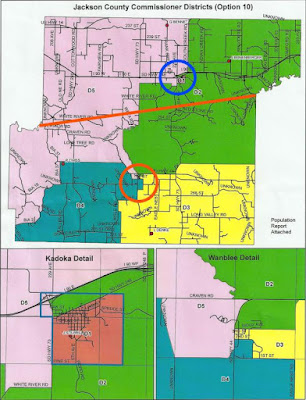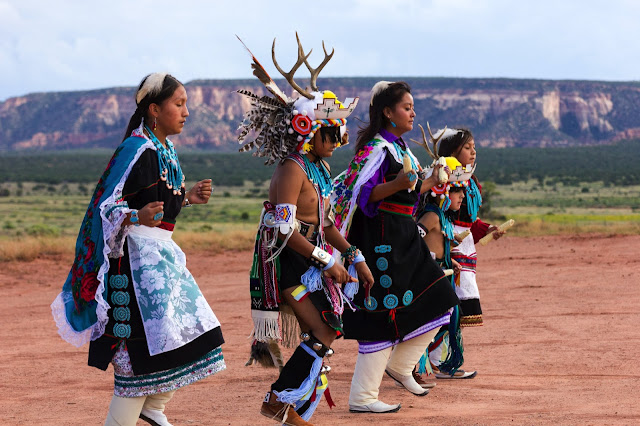South Dakota‘s Last Stand—Ballot Boxes, Red Herrings and Custer Envy
Jackson County, South Dakota, has dug in for a fight against Oglala Sioux plaintiffs who sued for a full-service satellite voting office on the portion of Pine Ridge Indian Reservation that overlaps the county. On May 11, Jackson County filed an answer to the Oglalas’ complaint, Poor Bear v. The County of Jackson, and requested that it be dismissed. Whites make up 43 percent of the county’s population, says the US Census, yet hold 4 of 5 county-commission seats and thereby control elections and other decision-making.
The county document mostly reiterated legal arguments that U.S. District Court Judge Karen Schreier had already rebuffed. As a consequence, Judge Schreier refused to dismiss Poor Bear. In her opinion, she noted that the plaintiffs might be able to prove “intentional discrimination,” a 14th-Amendment violation. Judge Schreier also presided over the Oglala voting-rights suit Brooks v. Gant, which in 2012 resulted in satellite voting for another part of Pine Ridge.
The county document mostly reiterated legal arguments that U.S. District Court Judge Karen Schreier had already rebuffed. As a consequence, Judge Schreier refused to dismiss Poor Bear. In her opinion, she noted that the plaintiffs might be able to prove “intentional discrimination,” a 14th-Amendment violation. Judge Schreier also presided over the Oglala voting-rights suit Brooks v. Gant, which in 2012 resulted in satellite voting for another part of Pine Ridge.
Brought by Oglala Nation vice president Tom Poor Bear and others, the suit asks for a reservation federal-elections office that’s open for the same amount of time and offers the same services as polling places in other South Dakota communities. According to the plaintiffs, lack of personal and public transportation means reservation residents (who live mostly below orange line in the map shown here) can’t get to the main elections office in the predominantly white county seat, Kadoka (in map’s blue circle).
This cuts them off from South Dakota’s in-person-absentee-voting and late-registration period, which starts 46 days before national elections. That, the plaintiffs allege, means unequal access and violations of the Voting Rights Act and the Constitution. So, they want an office in Wanblee (marked by the orange circle). The maps are courtesy Jackson County, and the indications are courtesy ICTMN.
A prominent voting-rights attorney was skeptical about Jackson County’s chance of prevailing. “In an answer to a complaint, defendants almost always state all the possible defenses they may have, and it looks like the county has done that here,” said Laughlin McDonald, special counsel and director emeritus of the American Civil Liberties Union Voting Rights Project. “However, in light of Judge Schreier’s opinion and the facts of the case, it doesn’t look as though the defenses have any merit.
OJ Semans, Rosebud Sioux co-head of Four Directions voting-rights group, described his take on Jackson County’s long game. “The county defendants know they’ve lost this round, but they want to be modern-day Indian fighters and appeal this lawsuit all the way to the Supreme Court,” Semans said. “They’d rather spend hundreds of thousands of taxpayer dollars fighting equality than one thousand implementing it. They, like Custer, are on the wrong side of history.”
Jackson County initially shot down the reservation satellite office for, among other reasons, an alleged lack of money. However, in the May 11 statement, the county admitted it now knows it has federal Help America Vote Act funding: “At the time this admission is made…Defendants are aware of the availability of HAVA funding to establish a satellite office in Jackson County.”
But the county still has money woes, the statement continued; its officials aren’t sure whether all satellite-office expenses would be reimbursed nor what would happen if its HAVA allocation ran out. The county made these claims despite being preapproved for HAVA funding, with the authorization and allowable expenses detailed in the 2014 South Dakota HAVA Plan, on the secretary of state’s website.
So, what if the county uses up its allocation? “It can write a grant for more money from funds the state holds,” said South Dakota HAVA coordinator Brandon Johnson. What happens when local governments wonder which expenses are legitimate? According to Johnson, they call him, and if he can’t answer, he calls the federal Election Assistance Commission and/or checks its past rulings. The county’s lawyer for this lawsuit, Sara Frankenstein, declined to comment for this article.
Some observers called the funding issue a red herring that distracted from the important VRA issues. “The Voting Rights Act doesn’t allow a jurisdiction to grant voting rights to one group and deny or burden the voting rights of another group,” said McDonald. “People must be treated equally.”
Bottom line, the judge now sets a scheduling order and the case moves forward, said one of the Oglala plaintiffs’ attorneys, Eileen O’Connor of Lawyers’ Committee for Civil Rights Under Law.
Text c. Stephanie Woodard; map credits as noted above.


